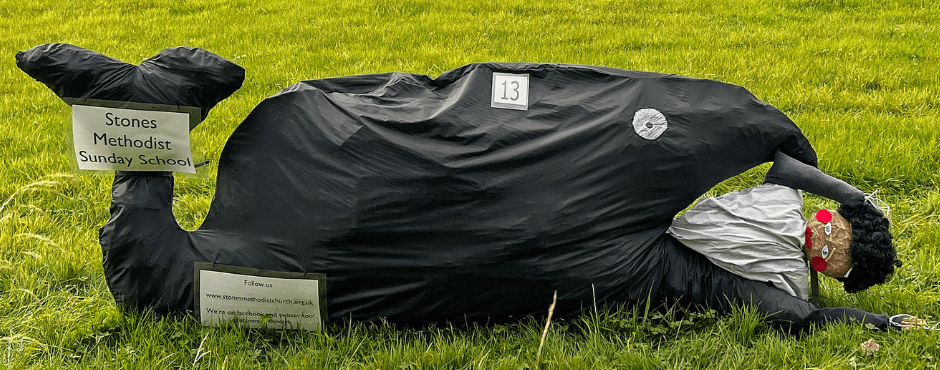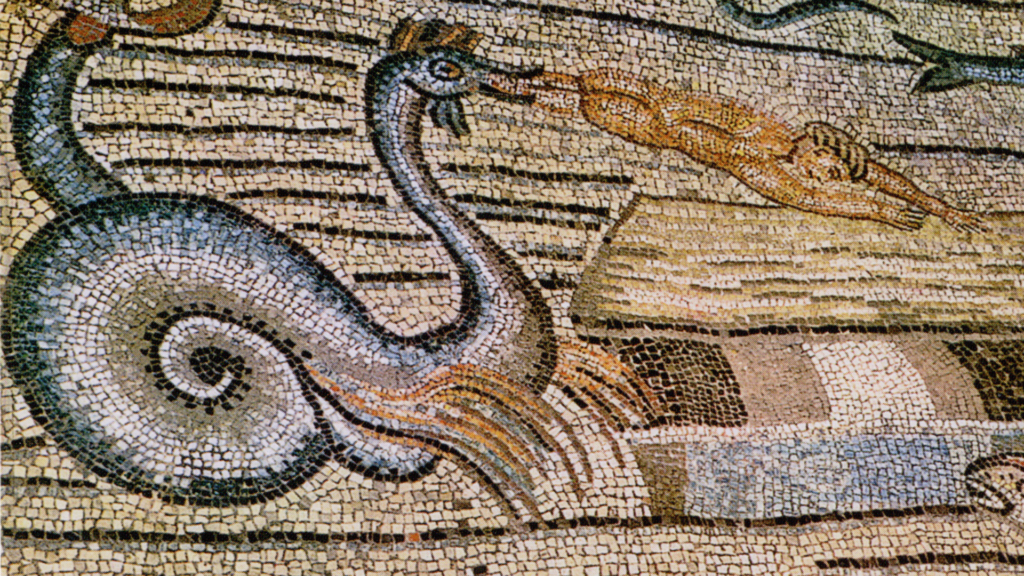A version of this post was previously shared as a sermon at Luther Seminary’s Wednesday chapel service.
It is an unfortunate human tendency to underestimate small things. I experienced this just the other day with our youngest daughter, Eliyah. Following her sister and dad, she likes to wear cowgirl boots—preferably bright cherry red. I sat down to help her put them on and she scowled at me and said, “I can do it myself.” Biting into that last word with an accent that the Arkansan side of my family would be proud of.
The book of Jonah is a book of small stature—akin to Ruth, Nahum, Habakkuk, or Philemon. Like other underestimated things, it often gets relegated to the realm of “children’s Bibles.” Jonah is something we can leave behind in our Sunday School classrooms before we turn to more serious books like Genesis, Isaiah, Romans, or Galatians. This may have something to do with the book’s obvious delight in humor, absurdity, and exaggeration. But the loss is ours if we mistake its humor for silliness or frivolity. The book is funny, but its humor is in service of serious theology.

[Jonah and the Whale, Tim Green, Creative Commons 2.0, via Wikimedia Commons]
One of those serious theological topics is God’s grace. Quite ironically, Jonah is the one who places grace at the center of this book when he puts his own spiteful twist on an Old Testament creedal statement: “O Lord! Is not this what I said while I was still in my own country? That is why I fled to Tarshish at the beginning, for I knew that you are a gracious and merciful God, slow to anger, abounding in steadfast love, and relenting from punishment” (Jonah 4:2).
You see, Jonah gets upset with Yhwh, because he knows that the God of Israel is a God of both law and gospel—he knew that on the other side of God’s judgment was a gracious welcome home. Knowing what we know about how Assyria treated both Judah and Israel, it’s hard to blame the prophet for his reaction to Yhwh’s grace. Assyria was the capital city of kings such as Sennacherib, who was so proud of his conquest of the Judahite city of Lachish that he dedicated an entire room to visual depictions of its conquest—including images of plunder, humiliation, and torture.
A chase scene
But God is intent on delivering a word to the city of Nineveh, whose “evil” has come before God’s presence. At first, we don’t really know the content of God’s message, only that Jonah is to “cry out against” her.
God is insistent—relentless—in making sure that Nineveh heard these words of judgment from the mouth of Jonah. We see Yhwh’s relentlessness in pursuing Jonah—onto the high seas and down to the gates of Hades itself. God goes to incredible lengths to ensure that the prophet completes his mission. Lives literally hang in the balance. It’s easy to forget that it is a 5-word sermon that stands between Nineveh’s salvation and her destruction.
In stark contrast to the good-enough-for-government-work obedience of Jonah, Nineveh repents to a degree that can only be described as “epic.” Everyone from the king to the beasts of burden repents before God—and God notices.
Upon seeing Nineveh’s action, Yhwh’s mind is changed. Repentance opens a new future for the city of Nineveh—a future beyond judgment.
But Jonah is also a recipient of divine grace. That grace manifests itself very differently for Jonah than it does for Nineveh.
Yhwh’s grace toward Jonah is understandably less apparent. I mean, just think about his week: Jonah gets called to deliver a message of judgment to a people that had annihilated the Northern Kingdom and routinely abused and exploited the people of Judah. Taking a hard pass on that career move, he becomes the only man in history against whom God throws an entire storm. After flipping the proverbial coin, his travel companions throw him overboard for being “that guy” at the party. Then like an ancient Boba Fett, he gets swallowed by a giant monster that doubles as a slimy school bus to hell where Jonah finally learns to see God’s presence as something to be sought after rather than fled. If that weren’t enough, Jonah famously puts the “projectile” into “projectile vomiting.” Picking the seaweed out of his beard, Jonah then takes a lengthy walk through a hostile city to deliver a 5-word sermon. And you think your week was hard …

[Floor Mosaic, Cathedral of Santa Maria Assunta, Aquileia, Italy, 4th Century]
God’s acts of grace toward Jonah show up in two places: when he is faced with his own death and when he boils over with anger about Nineveh’s deliverance from judgment. Upshot: God’s grace shows up when Jonah looks least deserving of it.
Yhwh’s first act of grace becomes apparent when one compares Jonah’s words and actions at the beginning of Chapter 1 with those at the end of Chapter 2.
Jonah 1:3 reads, “But Jonah rose to flee toward Tarshish away from the presence of Yhwh” (verse 3). Obviously Jonah hasn’t taken a systematics class on divine omnipresence, but whatever. For Jonah, God’s presence was something to be fled, something to be avoided, something to run away from. Jonah wanted nothing to do with God and God’s mission to the Ninevites.
But Jonah’s theology of divine presence undergoes a transformation in Chapter 2. In verses 4-6 we find the prophet lamenting God’s absence: “Then I said, ‘I am driven away from your sight; how shall I look again upon your holy temple?’ … I went down to the land whose bars closed upon me forever; yet you brought up my life from the Pit, O Lord my God.” Jonah’s near-death experience creates the conditions under which the prophet is able to see God’s grace clearly and brilliantly. The life-giving grace of God explodes on the scene precisely when Jonah’s life seems most bleak—as he is staring into the gaping maw of death itself.
Now, God’s grace toward Jonah also shows up after he delivers his oracle of judgment and the people of Nineveh repent. I always thought that Nineveh’s repentance seemed like a great end to the story: Jonah finally obeys God, he preaches the sermon of his life, people repent—finished, done, period, end of story.
Angry enough to die?
But biblical stories don’t end like Hollywood stories—with narrative bows nicely tied. Biblical stories are much more like human stories—messy, coarse, and unfinished.
At that time, Jonah’s anger boils to the surface and he offers Yhwh a sharp “I told you so” rebuke for showing mercy. Prophet and God then enter into a testy dialogue about the prophet’s anger over God’s merciful change of heart.
God poses a question that is intended to probe the reasons for Jonah’s anger: “Is it right for you to be angry?” In typical Midwest fashion, Jonah responds passive-aggressively—i.e., by not responding at all.
Instead, Jonah finds a place east of Nineveh to wait and see what would become of the city. Perhaps God would have another change of heart, reverse the decision, and give Nineveh what Jonah thought it deserved.
But God uses this opportunity to try and win over Jonah’s heart again by engineering a teaching moment, which as all parents know, always totally works … (It didn’t work for God, either.)

[Jonah the Prophet, Sargis Babayan, 2010.]
Not unlike Jonah’s encounter with the fish, God uses disruption and discomfort to provoke reflection and ultimately repentance on the part of the prophet. Yhwh grows a shade plant for Jonah, only to smite the vegetation with a worm, plunging Jonah back into the pit of petulance.
God’s response comes in the last three verses of the book:
“But God said to Jonah, “Is it right for you to be angry about the bush?” And he said, “Yes, angry enough to die.” Then the Lord said, “You are concerned about the bush, for which you did not labor and which you did not grow; it came into being in a night and perished in a night. And should I not be concerned about Nineveh, that great city, in which there are more than a hundred and twenty thousand persons who do not know their right hand from their left and also many animals?”
The book of Jonah ends with a question and with the prophet in an entirely unfinished state. We never know whether Jonah repents, only that God remains with him—offering him a future that is free from the manacles of malice.
God’s grace for Jonah shows up in the fact that God chooses not to let go of the prophet, despite the prophet’s best attempts to let go of his calling—and even of his own life.
God of compassion, your grace shows up in our lives in so many different ways. You meet us on the heights and in the depths, in moments of elation and at times when we cannot seem to release our resentment—at moments when change seems near and at moments when it seems impossible. Sometimes your gifts appear in the form of adversity, and at other times in last-minute reversals of fortune. However, your grace shows up in our lives today, I pray only that you will give us the perception to recognize it and the faith to receive it. Amen.



